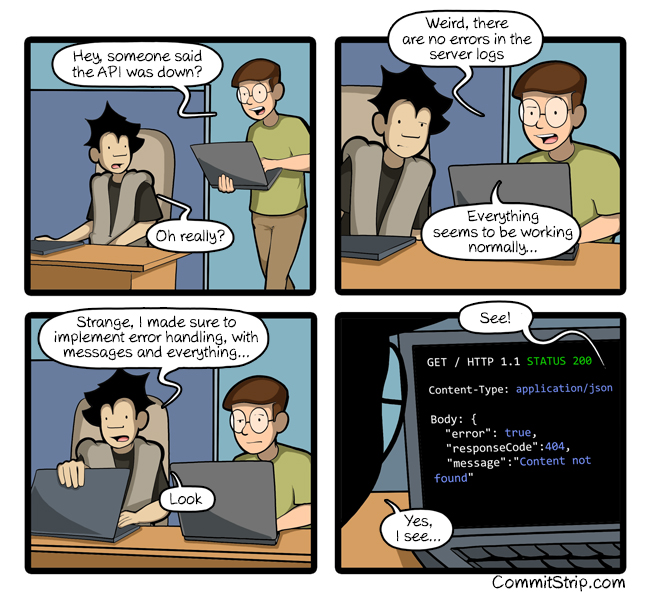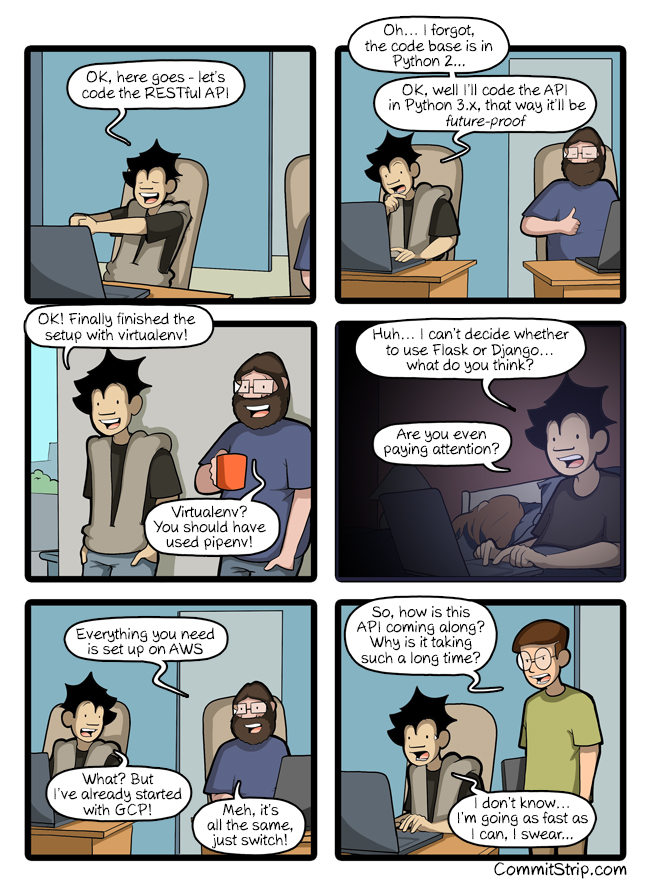Lattera
Shared posts
The People Who Fell From The Sky
LatteraReally great pilot episode!
Contributing to FLOSS
LatteraDoing this interview was fun!
I’ve been using FLOSS (Free/Libre and Open-Source Software) for almost two decades now and from time to time, I’ve been thinking about contributing to “return the favour”.
When I joined Fediverse, it struck me how many interesting projects there were and how much time people dedicated to work on them. Now I would really love to join and get active, but it’s very hard to find the time.
Not long ago I’ve got an idea to ask software engineers who are already active in FLOSS projects about that. How they find the time, organize their work and achieve life-work-FLOSS balance. So I did just that.
I’ve asked Mark Felder (FreeBSD port maintainer and Pleroma developer), Shawn Webb (co-founder of HardenedBSD, maintainer of several security-oriented software projects), lain (main Pleroma developer), Mateusz Piotrowski (also a FreeBSD port maintainer) and Michał Herda (a Common Lisp hacker).
Each of them has provided some interesting insights, so I’d like to take a look at the most interesting ones and some of the recurring topics mentioned by them.
FLOSS at work or as a hobby
I’ve noticed two approaches there: working on FLOSS projects at work if you’re lucky to have an employer who wills to pay for that, or doing it as a hobby, which I guess happens most of the time and in most of the projects out there, with only exceptions being huge projects backed by entire organizations (e.g. GNU/Linux, Mozilla Firefox).
Convincing one’s boss that FLOSS contributions pay off is not a piece of cake, so we can change perspective a bit here. We can choose employers who are willing to contribute to FLOSS.
There are many ways to contribute
As Shawn Webb points out, contributing to FLOSS is not limited to writing source code.
Advocacy. Talk to people about the cool things you’re doing with the project. Talk to them about how it has solved real-world problems for you.
Donate. This is a huge one. Donate hardware, software, and/or money. A lot of developers work on their projects in their spare time, like me, with spare resources. Donating funds allows them to pay for hosting services, DNS, etc. Donating hardware allows them to test their code in a variety of ways.
Document. Every project’s documentation could be improved in some way. Whether it be through translation or enhancements to any existing documents, help with documentation will always be gladly received.
Development. If you do have time to develop (though this question is about not having the time), do it! If you use the project at work, perhaps you can have your employer slice off some paid time for fixing bugs.
I think this is a very important thing to keep in mind. Not everybody has to write source code. Instead, those who benefit from that code being written could show appreciation with their donations.
Furthermore, supporting those who solve technical problems by adjusting documentation and spreading the word about their achievements might sometimes increase popularity, leading to more donations, more volunteer developers, etc.
Scratch your own itch
When it comes to developing software or documentation, it might be a good idea to start with software that you already use. You’ll probably know the issues and will find it easier than finding a project, learning about it and then supporting it this way or another.
The benefits of contributing
First of all, this is about getting more experience and learning in general. It is much better to learn by solving concrete problems rather than writing a “Hello World” app in your spare time. Hello Worlds rarely show you any useful tricks or complex problems. Bug reports from actual users will be real-life challenges – much more rewarding to solve and growth-provoking.
It’s not only the FLOSS source code we might learn from. Working with other engineers, each of which has different experience, is a great opportunity to learn as well.
Another point is that FLOSS contributions are often a very good way to provide potential employers with a sample of your work, showing your capabilities and style.
Don’t be afraid
Sometimes software engineers working on all those FLOSS projects seem to be so experienced and have so much knowledge, that it might demotivate one to get in touch and start getting things done. However, my experience proves that they don’t bite! It’s the opposite: each of the engineers I sent my questions to was so open and encouraging that their responses alone made me want to contribute!
Staying motivated
Sometimes there are going to be longer periods of no meaningful results or hard problems to solve that would require a lot of work. It might happen and it’s fine. Having clear goals will help a lot. Also, it’s important to remember why we are doingn it – for instance, a common cause is to give back to the community.
Conclusion
Reading all the replies I’ve got was an incredible experience and I’m thankful to all those who replied. Now I’m goinig to take the advice and start learning by doing.
HTTP Headers FTW
LatteraSomewhat ironically, I've seen some web developers advocate for always returning 200 on error, to obfuscate whether an error occurred. I'm unsure whether such a practice actually increases security.

ARM says its next processors will outperform Intel laptop chips
LatteraI think, or at least hope, arm64 and risc-v are the future.
 ARM-based laptops have been pretty pokey to date, but you might have a different impression of them in a year or two. The company has offered a rare peek at the performance expectations for its future processor architectures, and the figures might m...
ARM-based laptops have been pretty pokey to date, but you might have a different impression of them in a year or two. The company has offered a rare peek at the performance expectations for its future processor architectures, and the figures might m...
Rewards of Up to $500,000 Offered for FreeBSD, OpenBSD, NetBSD, Linux Zero-Days
LatteraFreeBSD's gonna get popped left and right.
Read more of this story at Slashdot.
Obituary: The Maximum Pressure Policy
LatteraReally good reading prior to the DPRK+US summit.
A family spokesman confirmed today that the maximum pressure policy passed away on April 27, 2018. This was not noticed…
The post Obituary: The Maximum Pressure Policy appeared first on 38 North.
Why does it take such a long time?
LatteraThis is what happens because of agile development: You just end up doing stuff to do stuff. You run around chasing the red dot.
If you had properly architected your project prior to writing even a single line of code, you would have a list of tools and choose from them according to the needs of the project.
Meaning, you end up making toolset decisions on purpose, not just "because that's what people do or what I need right now."

Russian hackers mass-exploit routers in homes, govs, and infrastructure
LatteraThis is why having state-of-the-art exploit mitigations is crucial, especially on publicly exposed devices. I'm glad my firewall runs OPNsense.

Enlarge (credit: US Air Force)
Hackers working on behalf of the Russian government are compromising large numbers of routers, switches, and other network devices belonging to governments, businesses, and critical-infrastructure providers, US and UK officials warned Monday.
The Russian government-sponsored actors are using the compromised devices to perform man-in-the-middle attacks that extract passwords, intellectual property, and other sensitive information and to lay the groundwork for potential intrusions in the future, the officials continued. The warning was included in a technical alert jointly issued by the US Department of Homeland Security and FBI and the UK's National Cyber Security Center.
"Since 2015, the US government received information from multiple sources—including private- and public-sector cybersecurity research organizations and allies—that cyber actors are exploiting large numbers of enterprise-class and SOHO/residential routers and switches worldwide," Monday's technical alert stated. "The US government assesses that cyber actors supported by the Russian government carried out this worldwide campaign. These operations enable espionage and intellectual property that supports the Russian Federation's national security and economic goals."
Is the US Preparing for Preventive War? Views from North Korea
LatteraReally good article on why DPRK does not want war with the US.
In mid-November 2017, I spent several days in Pyongyang talking to DPRK foreign ministry officials about the prospects of war…
Is the US Preparing for Preventive War? Views from North Korea is an article from 38 North: Informed Analysis of North Korea, published by the US-Korea Institute at SAIS.
FLIMP! The GIMP has a security problem
LatteraThe authors chose FreeBSD as their platform to write this exploit due to FreeBSD's lack of exploit mitigations, including ASLR.
It's nice to see that in HardenedBSD, this vulnerability is mitigated by:
1) PaX ASLR
2) PaX NOEXEC
3) PIE
4) RELRO + BIND_NOW
In 2014, when starting the Fuzzing Project, Hanno Böck did some primitive fuzzing on GIMP and reported two bugs. They weren't fixed and were forgotten in the public bug tracker.
Recently Tobias Stöckmann found one of these bugs and figured out that it's easy to exploit.
Uh... that's bad!
We think so, too.
What kind of bug is that?
It's a classic heap buffer overflow in the FLIC parser. FLIC is a file format for animations and was introduced by Autodesk Animator.
How does the exploit work?
Tobias has created a detailed writeup.
Why is the exploit for FreeBSD?
Modern Linux systems use Address Space Layout Randomization (ASLR), which makes exploiting buffer overflows much harder.
FreeBSD doesn't use ASLR by default.
Oh... That sounds bad, too?
We agree.
The exploit doesn't work for me!
We figured out it's unreliable and the memory addresses are depending on many circumstances. The exploit ZIP comes with two variations using different memory addresses.
Try both of them. We also noticed putting the files in a subdirectory sometimes made the exploit work.
Anything more to tell about the GIMP?
There's a wide variety of graphics formats. GIMP tries to support many of them, including many legacy formats that nobody is using any more today.
While this has obvious advantages - you can access the old images you may find on a backup CD from 1995 - it comes with risks. Support for many obscure file formats means many parsers that hardly anyone ever looks at.
So... what about the other parsers?
The second bug, which is a simple overread, was in the TGA parser. Furthermore we found buffer overreads in the XCF parser, the Gimp Brush (GBR) parser and the Paint Shop Pro (PSP) parser.
We found another Heap buffer overflow in the Paint Shop Pro parser which is probably also exploitable.
In other words: The GIMP import parsers are full of memory safety bugs.
How do you find these bugs?
With some effort it's possible to use american fuzzy lop - a state of the art fuzzing tool - together with Address Sanitizer to fuzz GIMP.
This is not straightforward. GIMP's import plug-ins are separate executables, crashing them doesn't crash the main process.
The fuzzing process is very slow, but we have some ideas on how to improve it.
We wanted to submit a fuzzing tutorial to the GIMP wiki. Unfortunately our attempts to get an account for the GIMP wiki were as successful as our attempts to get these bugs fixed. For now the tutorial lives here, but we still think it'd be better to have that hosted somewhere with the GIMP project.
So what now?
Our attempts to communicate with the GIMP developers have been met with silence. Some of the bugs reported have patches attached, most of them haven't been applied. We also tried contacting the GNOME security team. They tried to help, but weren't successful either.
We get the impression that security is no priority for GIMP. We think this needs to change.
What should happen?
First of all obviously all known memory safety bugs should be fixed.
Furthermore we believe the way GIMP plugins work is not ideal for security testing. The plug-ins are separate executables, however they can't be executed on their own, as they communicate with the main GIMP process.
Ideally either these plug-ins should be changed in a way that allows running them directly from the command line or - even better - they should be turned into libraries. The latter would also have the advantage of making the parser code useable for other software projects.
Finally it might be a good idea to sandbox the import parsers.
Anything else?
GIMP makes use of the exiv2 tagging library, which has its problems, too, and a couple of unfixed security bugs.
We also think GIMP should think about the security of their downloads.
FLIC... FLIC... is it possible I heard this story before?
Gstreamer recently also had a serious bug in the FLIC parser that was discovered by Chris Evans.
Who drew the logo and what's the license?
The original GIMP logo was drawn by Tuomas Kuosmanen. The modified version was created by Ludwig van Boltzmann.
The original logo was released under the GPL 2 or later, the modified version is released under the same license.
Who did this?
This is a project by Hanno Böck and Tobias Stöckmann.
The website design was "stolen" from the DROWN website and slightly adapted; it was created by Sarah Madden. The logo was created by Ludwig van Boltzmann and is a modification of the official original GIMP logo by Tuomas Kuosmanen. It is licensed under the GPLv2 or later. The webpage design is under a CC0 license. | Imprint
Jeff sessions on marijuana enforcement
LatteraI can't wait for marijuana to be fully legalized for both recreational and medicinal use.
A year ago, when president-elect Donald Trump announced Senator Jeff Sessions would be his attorney general, advocates for marijuana law reform were suddenly seized with panic. The longtime Alabama senator, they knew, had once joked that he considered the Klan to be OK guys until he found out they smoked pot. Only they weren’t quite sure he was kidding.
Sessions’ appearance at his confirmation hearing in early January did little to allay those fears. During testimony best remembered for the attorney general’s commitment to recuse himself from any investigation related to the 2016 election, the nominee was asked about medical marijuana by Vermont Senator Pat Leahy: “Would you use our federal resources to investigate and prosecute sick people who are using marijuana in accordance with their state laws, even though it might violate federal laws?”
Story Continued Below
This browser does not support the Ad element.
“I won’t commit to never enforcing federal law, Senator Leahy,” Sessions replied, suppressing a slight smirk. That double negative tightened the knot in every drug policy reformer’s gut. Exactly how vulnerable were the nascent marijuana industries in the 29 states where it was now legal? Would Sessions, who rarely misses an opportunity to bemoan the scourge of marijuana, sweep aside the paper-thin order imposed by the Obama administration that had stayed the enforcement hand of the Department of Justice? Would SWAT teams arrest wheelchair-bound medical marijuana patients, raid marijuana dispensaries and shut down the high-tech growhouses that supplied them?
The dreaded crackdown never materialized. Sessions, perhaps preoccupied with other priorities like keeping his volatile boss from firing him, remained largely inactive on the subject. Meanwhile, a series of incremental advancements on the pro-marijuana front helped to further enmesh the $9.7 billion industry into the commercial fabric of the nation, 60 percent of whose residents support some form of legal pot. California opened the doors to recreational marijuana and issued regulations for outdoor marijuana festivals; Florida began its implementation of a medical marijuana program; and Denver and Las Vegas are vying to become the first city in America to legalize “marijuana consumption lounges” (think high-end bars with expensive weed choices instead of booze). Sessions, for his part, has spent his time in testy exchanges with DOJ interns and convening meetings with small groups of like-minded anti-pot activists determined to roll back state-level momentum. “I do believe … that the public is not properly educated on some of the issues related to marijuana,” he told one such group on Friday.
But things are suddenly looking rosier for Sessions. Thanks to Congress’ fumbling over the spending bill, the AG’s yearning to battle legal marijuana may get a major boost without him having to lift a finger. That’s because Rohrabacher-Farr, a little-known and even less discussed amendment that protects state-legal medical marijuana programs from federal interference, is close to expiring. If the government shuts down at the expiration of the current continuous resolution on December 22, or if negotiations in an upcoming appropriations conference committee fail to insert it in the final draft of the spending bill—entirely possible given House Republicans’ hostility to marijuana—Sessions would be free to unleash federal drug agents on a drug, which according to federal drug law, is considered the equal of heroin and LSD.
The politics on this issue has shifted so dramatically that reform advocates, instead of quaking in their boots at Sessions’ saber rattling, are actually itching for the fight.
“Part of me just thinks: Let ‘em try. There will such a ferocious backlash,” Rep. Earl Blumenauer of Portland, Oregon, told POLITICO Magazine in response to a question about a potential Sessions-led crackdown. (Blumenauer replaced Sam Farr as the amendment’s Democratic co-sponsor after Farr’s retirement, so in a turn that does not help its branding efforts, Rohrabacher-Farr is now called Rohrabacher-Blumenauer.)
Morgan Fox, communications manager of the Marijuana Policy Project, agreed with Blumenauer: “There’s no way that Sessions can start rolling back medical marijuana policies or attacking patients and providers without looking like the bad guy.”
Still, with the legislative barrier gone, there would be plenty of ways for Sessions to make life difficult for marijuana businesses without creating dramatic footage for the nightly news. Fox worries less about SWAT team raids than the possibility the Department of Justice would quietly send letters to landlords who rented to legal marijuana businesses to threaten them with asset forfeiture.
People would be forgiven for thinking that state-legal medical marijuana was a settled issue, but in fact it is hanging by a thread, and Congress is poised to hand Jeff Sessions the scissors.
***
From the beginning of his tenure, Attorney General Sessions’ public rhetoric seemed to promise that he would waste no time before he undid the protections of the Cole Memo, the four-page memorandum issued in 2013 to all U.S. attorneys that granted them a great degree of prosecutorial discretion as to how to use the federal government’s limited crime-fighting resources.
Story Continued Below
This browser does not support the Ad element.
“I, as you know, am dubious about marijuana,” Sessions told the National Association of Attorneys General in February. “States can pass whatever laws they choose, but I’m not sure we’re going to be a better, healthier nation if we have marijuana being sold at every corner grocery store.” In early April, he announced that the DOJ’s Task Force on Crime Reduction and Public Safety would include a new subcommittee to evaluate marijuana enforcement policy, marking, in the eyes of many marijuana observers, the start of Sessions’ effort to roll back the needle-threading compromises of the Obama administration.
Less publicly, Sesssions was going after Rohrabacher-Farr. In May, he wrote a letter to members of Congress asking them to undo the protections provided by the amendment: “I believe it would be unwise for Congress to restrict the discretion of the Department to fund particular prosecutions, particularly in the midst of an historic drug epidemic and potentially long-term uptick in violent crime,” Sessions wrote in the letter, which was first obtained by Tom Angell, an advocacy journalist and founder of the nonprofit Marijuana Majority, and confirmed by the Washington Post.
First introduced in 2001 as Rohrabacher-Hinchey, the amendment was first passed as Rohrabacher-Farr in 2014 after seven tries, and reauthorized with a greater majority in 2015. But after the near-passage of a gay rights-related amendment in June 2016 that embarrassed House leadership, Paul Ryan and Pete Sessions, chairman of the House Rules Committee and no relation to the attorney general, shut down the amendment process, leaving measures like Rohrabacher-Farr unprotected even though it could easily pass given that 66 members of the House signed a letter addressed to House and Senate leadership urging its passage. (Pete Sessions declined multiple requests for comment.)
Sessions isn’t the only one fighting against Rohrabacher-Farr. He has help from Smart Approaches to Marijuana, or SAM, an anti-legalization group run by Kevin Sabet, one of the handful of attendees at Sessions’ meeting December 8 at DOJ. “We’ve been fighting behind the scenes to remove Rohrabacher-Farr because it really ties the hands of law enforcement,” Sabet told POLITICO Magazine. “On the Hill this year, we’ve had really good progress, like what we did in the Rules Committee.”
During the summer, all signs pointed to Jeff Sessions’ imminent action against legal marijuana, but in August, the DOJ’s Task Force on Crime Reduction and Public Safety, which had been at work behind closed doors since April, reported back with no new policy recommendations to curb legal marijuana programs, advice that would have remained secret if the Associated Press hadn’t obtained the documents. It signaled that maybe that the federal prohibition on marijuana was practically unenforceable without state and local police doing the feds’ dirty work.
“I will push back on any federal effort to interfere with our laws and not share information if it’s not related to a criminal investigation under our own law or ordered by a court,” Rep. Jared Polis, a Colorado Democrat and fierce advocate of marijuana legalization, said on Monday in a Reddit “Ask Me Anything” thread. “So as long as we don’t cooperate it would be hard, almost impossible, for there to be a major federal-only enforcement action.”
As recently as late November, Sessions signaled that his Justice Department remains committed to re-evaluating the Cole Memo: “In fact, we’re working on that very hard right now. We had meetings yesterday and talked about it at some length,” he said during a press conference meant to highlight the DEA’s new tools in fighting the opioid crisis. Exactly what he plans to do remains a mystery.
With Sessions keeping his cards close to the vest, it’s hard to say what might happen because of the otherwise chaotic nature of this administration. Where is the president on this issue? In February 2016, candidate Donald Trump told FOX News host Bill O’Reilly, “By the way -- medical marijuana, medical? I’m in favor of it a hundred percent.” At CPAC later that month, Trump responded to a question on Colorado’s legalization of marijuana by saying, “I think it’s bad. Medical marijuana is another thing, but I think it’s bad,” seeming to draw a line between medical use and adult recreational use.
Story Continued Below
This browser does not support the Ad element.
In March of this year, President Trump put “solving the opioid crisis” in the basket of responsibilities for his son-in-law and senior advisor, Jared Kushner, who then handed off the opioid crisis to his reported frenemy, Chris Christie, the soon-to-be-former governor of New Jersey, in the form of a task force called the Commission on Combating Drug Addiction and the Opioid Crisis. One of the first acts of Christie’s task force was to seek public comment for suggestions. Its interim report touted “more than 8,000 comments from the public,” of which the ONDCP later admitted to Vice News that more than 7,800 were suggestions to legalize marijuana as a means of combating the opioid crisis. It was a suggestion the task force promptly ignored. In May, Christie said taxes collected on medical marijuana was “blood money,” and that the whole concept of medical marijuana was “beyond stupidity.”
Kevin Sabet is encouraged. “When you have [the task force] agreeing that marijuana legalization is a bad idea and that it would not help the opioid epidemic, the White House hears that. They hear that loud and clear,” Sabet told POLITICO Magazine. Translation: Sabet thinks Trump will do what Sessions wants when it comes to marijuana.
***
With the threat of a government shutdown delayed until December 22, there is now some breathing room, but Rohrabacher-Blumenauer is still at risk of not making it through the conference committee because of Paul Ryan and Pete Sessions have bottled up the amendments process in the House.
“I don’t know what went through his head, in terms of preventing us from having a vote on the floor of the House,” Blumenauer said, referring to Pete Sessions. “I think before the year is over that Pete is going to find out that position is not popular in Texas.”
For now, marijuana amendments are out of order. That means that the extension of these protections rests squarely on the shoulders of the Senate, where a companion amendment to Rohrabacher-Blumenauer sponsored by Pat Leahy passed by a voice vote in July without much fanfare or controversy.
Leahy’s office did not respond to multiple requests for comment for this story, but Leahy’s counterpart, Senate Appropriations Chairman Thad Cochran, R-Mississippi, told POLITICO Magazine through a spokesman, “As you know, medical marijuana-related provisions in the Senate bills were approved with bipartisan support,” a statement that is sure to leave House Republican leadership feeling a little frosty with their Senate Republican colleagues seemingly unwilling to back them up on a fight that House leadership has picked.
It’s still unclear how marijuana reform will fare in the conference committee. “It all comes down to how much Leahy cares to fight about this behind closed doors,” Tom Angell told POLITICO Magazine. “That’s what it comes down to.”
At time of writing, Congressional leaders had not yet settled upon top line numbers for military and nonmilitary spending to even begin negotiations that would lead to a conference committee, where smaller issues like marijuana will get sorted out. Still, with a certain amount of confusion in the air, optimism for continued reform was winning the day.
Story Continued Below
This browser does not support the Ad element.
“It’s more trouble than it should be, but I think it will ultimately be protected,” Blumenauer told POLITICO Magazine. “And what’s going on right now is going to accelerate further reform.”
Looking forward to the 2018 midterm elections as Congress continues to hemorrhage incumbents (including House Judiciary Committee Chairman Bob Goodlatte, a powerful anti-marijuana voice), even safe Republican seats are likely to be filled by younger Republicans who tend to support marijuana law reform. “Just by the generational shift, replacing older members with younger members, is going to put us in a better situation whether or not those districts flip parties,” Angell said. “If you look towards next year, there’s like 35 gubernatorial races, and there’s a ton of major party candidates who are on the record in favor of legalization.”
As for Kevin Sabet and his anti-marijuana group SAM, “We have raised more money this year than ever before,” Sabet said, meaning they will be out there fighting against the forces of legalization in 2018. That’s a challenge Blumenauer welcomes.
“The public is behind us. Both chambers of Congress are behind us, and if they choose to make it a partisan issue,” Blumenauer said, “it won’t go well for them.”
No matter what happens, one can guarantee that the status quo won’t hold for long: Congressional leaders will soon tire of the drama surrounding the annual reauthorization of Rohrabacher-Blumenauer, and the Cole Memo is dust in the wind as soon as Jeff Sessions says so. “If I was a betting man, I’d say that the Cole Memo will not be the final word. Everyone knows that,” Sabet said. “It’s like ‘Don’t ask, don’t tell.’”
Of course, we know what happened after that was struck down.
Netflix may run Watergate series developed by George Clooney
 Netflix's ability to reel in big-name stars may have just secured a very topical political drama. Sources for Hollywood Reporter and Variety have learned that George Clooney and Bridge of Spies writer Matt Charman are working on Watergate, an eight-e...
Netflix's ability to reel in big-name stars may have just secured a very topical political drama. Sources for Hollywood Reporter and Variety have learned that George Clooney and Bridge of Spies writer Matt Charman are working on Watergate, an eight-e...
The Underhanded C Contest Is Back
LatteraI might compete this year.
Read more of this story at Slashdot.
PBS shows how hacking is reclaiming its good name after a bad rap (video)
LatteraReally good video by PBS.
Hacking is still a loaded concept for many, often conjuring negative images of corporate espionage, fraudsters and prank-minded script kiddies. PBS' Off Book wants to remind us that hacking wasn't always seen this way -- and, thanks to modern developments, is mending its reputation. Its latest episode shows that hacking began simply as a desire to advance devices and software beyond their original roles, but was co-opted by a sometimes misunderstanding press that associated the word only with malicious intrusions. Today, hacking has regained more of its original meaning: hackathons, a resurgence of DIY culture and digital protests prove that hacks can improve our gadgets, our security and even our political landscape. We still have a long way to go before we completely escape movie stereotypes, but the mini-documentary may offer food for thought the next time you're installing a custom ROM or building your own VR helmet.
Filed under: Misc, Networking, Internet, Alt
These Wing Suit Fliers in Rio Will Blow You Away
LatteraFreaking awesome.
Hackers open up offline play, modding tools for SimCity
 Highways... in the middle of a city? Dare to dream, SimCity owners.
Youtube / UKAzzer
Highways... in the middle of a city? Dare to dream, SimCity owners.
Youtube / UKAzzer
EA and Maxis' claim that it would take "significant engineering work" to make a workable offline version of SimCity took another hit today. Hackers have released modding tools that disable the game's periodic server checks without breaking the simulation. The tools also unlock other features not in the final game.
reddit is abuzz with news and guides for installing the SimCityPak, a downloadable package of files that lets players edit many elements of the UI and underlying game logic. The tools aren't incredibly user-friendly for the time being, but those with some Javascript experience and patience to learn can do things like disable the online connectivity requirement, fix the "fudged" population display, and even affect how the basic simulation works in some ways.
Hackers are still poring through the code to see what kinds of new features and gameplay can be unlocked (including, potentially, the holy grail of increased city size limits), but one of the most exciting discoveries so far has been a way to easily uncover the developers' debug mode. This mode allows for many features that players have been asking for in the consumer version of the game, including the ability to build highways through city limits and in the regional "dead space" between cities. These changes will apparently stay valid in the wider region after the city is synced to EA's central servers, though other users' cities will not see edits made to the regional landscape.
Read 4 remaining paragraphs | Comments
